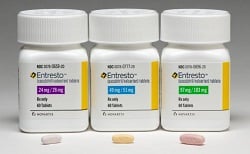Novartis ($NVS) doesn't mind saying that Entresto fell short in the fourth quarter. The hotly anticipated heart drug brought in a paltry $5 million, not much given its impressive study data. But the Swiss drugmaker says Entresto is about to make an upward turn, and it's pushing hard to make sure that happens.
The company has been negotiating deals with payers to open the door for patients to actually get their hands on the drug. And on the sales side, it has retrained the field force to better target physicians. Novartis is focusing mostly on cardiologists, but also on the 10% of primary care doctors who write the most heart-failure scripts.
Plus, the company plans to expand the Entresto team. It "went light" at first on cardiology-focused sales reps because it anticipated some coverage problems, but now plans to add to that field force during the second quarter.
 Payers are the big obstacle, Novartis Pharma chief David Epstein said during the company's fourth-quarter earnings call. Most Medicare plans, which cover 65% of potential Entresto patients, are taking the full 6 months allowed by law to evaluate a new product. Back in October, three months after Entresto's FDA approval, Novartis had "virtually no access for the brand" in Medicare, so even with a script in hand, "the patient was highly unlikely to have their insurance company pay for it," Epstein said.
Payers are the big obstacle, Novartis Pharma chief David Epstein said during the company's fourth-quarter earnings call. Most Medicare plans, which cover 65% of potential Entresto patients, are taking the full 6 months allowed by law to evaluate a new product. Back in October, three months after Entresto's FDA approval, Novartis had "virtually no access for the brand" in Medicare, so even with a script in hand, "the patient was highly unlikely to have their insurance company pay for it," Epstein said.
"Our teams worked very hard during November and December, and as a result, we have signed a large number of contracts with formularies that are intended to open access," Epstein said. In January, the sales force was retrained to get ready for that, too.
By the end of January, 70% of Medicare patients will have some access; though many plans will require prior authorization, about two-thirds of patients with access will enjoy the lowest-tier copay, he said. On the private-pay side, almost 80% of plans are covering Entresto, with almost three-fourths of those patients on the low-tier level.
To get that coverage, Novartis did have to offer rebates. The Medicare plans used their 6-month window to start out pushing for large rebates, as they often do, but "over time you reach a place where both sides are happy," Epstein said on the call. "I actually feel that we did a good job. I won't give you exact numbers, but actually, the rebate requests came down over time, rather than going up over time."
Now, Novartis is making sure to steer reps toward physicians whose patients can get their scripts covered. "We would expect sales to start to improve now," Epstein said on the call, with a real uptick in the second half of the year. The field force has new promotional materials and "great clarity on which of their physicians have patients that have access, and which do not."
As the year goes on, Novartis expects the prior authorization hurdles to coverage to come down, because patients and doctors will start to complain to insurers about it. To nudge payers toward that move, the company might offer "a little bit incremental rebate," but probably not till next year.
The company achieved one new goal it had set out for Entresto payer deals: performance-based pricing. With two plans--which the company declined to name--Novartis set a "fairly modest" base rebate which will rise or fall depending on the drug's performance. If Entresto helps the plan save money on hospitalization or other costs, the rebate goes down. If it doesn't, the rebate goes up.
"[W]e think that's going to become something that becomes more and more popular in the U.S. and around the world," Epstein said.
- see the call transcript from The Street
Special Report: The 25 most influential people in biopharma in 2015 - David Epstein - Novartis